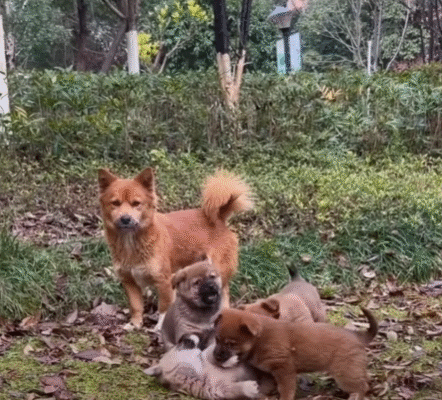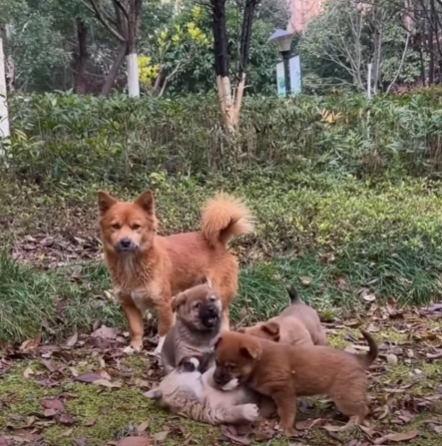
The sun was just beginning to dip below the horizon, casting a warm orange glow across the quiet neighborhood streets. I had been walking down a familiar alley, the one lined with abandoned buildings and overgrown shrubs, when I noticed a small figure dart behind a rusted fence. At first, I thought it was just another stray searching for scraps, but something about her movement caught my attention. She was not running aimlessly — she moved with purpose, yet cautiously, her body low to the ground, her ears back.
As I approached slowly, I realized she was a dog — a timid stray, thin and weary, with patches of matted fur clinging to her skin. Her eyes, wide and wary, tracked me carefully. I stopped a few feet away, letting her see that I was not a threat. She did not bark or growl; instead, she stayed frozen, shivering slightly. The alley was silent except for the distant hum of traffic and the soft rustle of leaves in the evening breeze.
Then I noticed a tiny bundle beneath her chest. It was a puppy — small, fragile, and looking at me with bright, curious eyes. The mother dog nudged the little one gently with her nose, keeping it close, protective, yet calm. Something in her posture told me that she had made a decision — that she had chosen me as someone who might help.
For a few moments, we simply stared at each other. Her gaze was pleading, almost human in its intensity. Then, carefully, she lifted the puppy into her mouth, cradling it delicately as she took a step toward me. My heart skipped a beat. She wasn’t forcing the puppy to me. She wasn’t pushing or shoving. She was offering it — her most obedient, most trusted little one — and, in that act, asking for help.
I knelt slowly, my hands outstretched but relaxed. “It’s okay,” I whispered softly, hoping my tone would reassure her. The mother dog hesitated for a moment, her eyes flicking between me and the puppy. Then, as if making up her mind, she stepped closer and gently set the puppy at my feet. She did not let go entirely — she stayed near, watching every movement, her body tense yet calm.
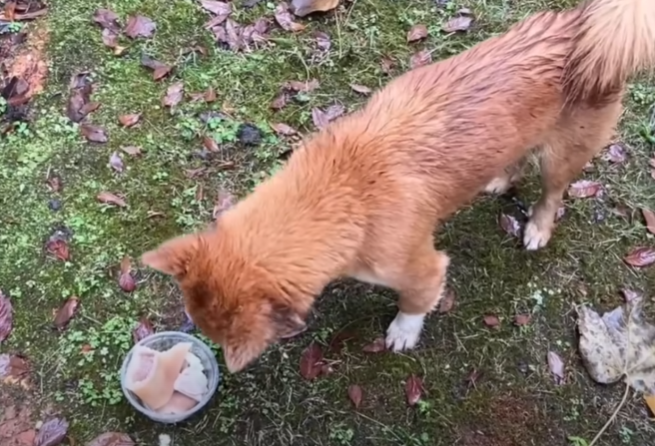
It was a quiet, profound moment. This small, timid dog, who had lived her entire life on the streets, had recognized in me a chance for safety. She had trusted me with her child, her most obedient little puppy, and it was a responsibility I did not take lightly. I reached out slowly and lifted the puppy, feeling its tiny heartbeat against my palms. It was warm, fragile, and perfectly trusting — just as its mother had hoped it would be.
The mother dog circled us carefully, sniffing at the edges of the blanket I had brought. She made soft, almost pleading whines, nudging me gently with her nose. She wasn’t demanding anything, but there was no mistaking her message: Keep my puppy safe.
I realized then that the mother dog had a choice. She could have run, kept her puppy, or hidden it somewhere else. But she chose me. She chose to trust a stranger with her most precious possession. And in that decision, there was a story of survival, love, and instinct that words could scarcely describe.
I carried the puppy to my car, wrapped in a soft blanket to keep it warm. The mother dog followed closely, careful not to lose sight of her little one. I could see her eyes scanning the surroundings, alert for any signs of danger, yet calm enough to trust me. She stayed just behind, always near, never leaving the space between us.
The ride to the shelter was quiet. The puppy slept nestled against my chest, and the mother dog trotted alongside the car when we finally arrived. Volunteers were ready with food, water, and blankets, and as soon as we entered the facility, the puppy was placed safely on a soft mat. The mother dog paused at the entrance, looking back at me as if checking one last time to ensure her child was safe.
It took hours of gentle coaxing to gain her full trust. She was cautious, skittish, and shy, but always observant. She watched our movements, studied our intentions, and slowly began to relax in the presence of humans who wanted to help. It was clear she had been through hardships — the telltale signs of a street dog: scars, matted fur, and wary eyes that had learned to judge danger at a glance. Yet beneath her timidity was a deep, unshakable love for her puppy.
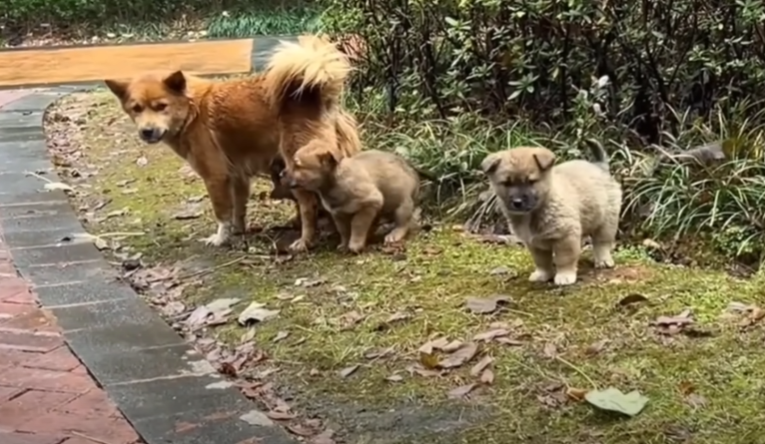
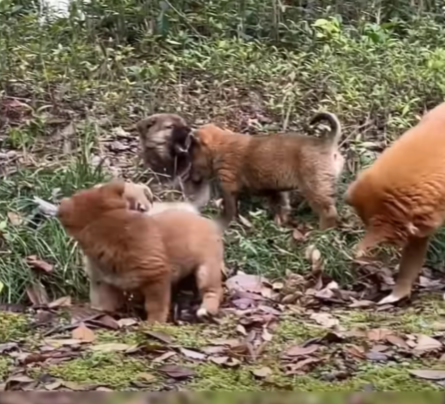
We named her Luma, after the soft glow of the setting sun that had illuminated her when I first saw her, and her puppy became Little Star. Over the next few days, Luma’s transformation was remarkable. She began to trust us more, always keeping an eye on her baby, but allowing us to provide food, water, and gentle care. Little Star thrived under our attention — gaining weight, energy, and curiosity — and Luma watched proudly, occasionally nudging him toward us as if encouraging the bond.
One evening, as I sat on the floor with Little Star sleeping beside me, Luma approached, laying her head softly against my knee. It was a moment of connection that transcended words. She had chosen to trust us, and in return, we had offered safety and care. Her timid nature was still present, but it had softened, replaced by cautious hope.
Luma taught me more than any words could convey. She demonstrated the depth of a mother’s love, the instinct to protect, and the wisdom to seek help when needed. Her actions were deliberate and meaningful: she had carried her most obedient puppy to me, pleading silently for a safe home, trusting that our hands would be gentle, that our intentions would be pure.
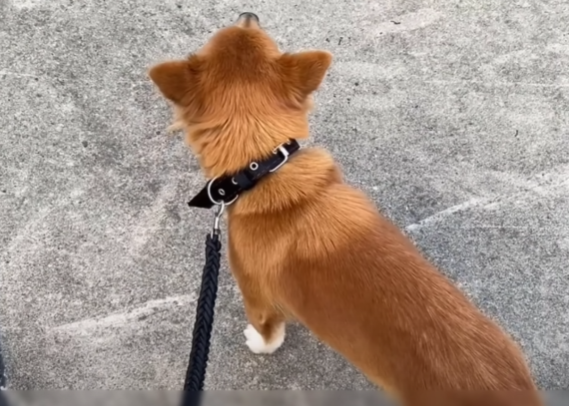
Over the next few weeks, we worked with Luma to help her overcome her fear. Daily walks, gentle handling, and positive reinforcement gradually transformed her. She became more confident, though still reserved, always protective of Little Star but beginning to explore the world around her. The bond between mother and puppy was unshakable, a testament to the enduring power of maternal care and instinct.
Watching Luma and Little Star grow together was profoundly moving. Little Star’s playful energy contrasted with Luma’s cautious demeanor, yet it was clear that their connection was unbreakable. Luma’s eyes always followed her puppy, and Little Star responded with trust and affection, a cycle of love and care that mirrored the world we hoped to provide for them.
This experience reminded me why rescue work is so important. It’s not just about providing food or shelter; it’s about recognizing trust, responding to silent pleas, and offering a chance at life and safety. Luma had reached out to us, carrying her most obedient puppy, seeking help in a world that had not always been kind. Our role was to honor that trust and to ensure her plea was answered.
Eventually, both Luma and Little Star were ready for adoption, their health restored, their spirits renewed. Families were found who could provide permanent homes, yet the bond they shared remained a story we carried in our hearts — a story of a timid stray dog, a devoted mother, and the quiet, powerful plea for help that bridged the gap between species.
That day, when Luma carried Little Star to me, it was more than a simple act. It was a message: Even in fear, we can trust. Even in hardship, we can reach out. And when help arrives, life can begin anew.
I will never forget the trust in her eyes, the gentle courage of a mother, and the miracle of connection that allowed us to save her puppy. Luma and Little Star became more than just rescues; they became a symbol of hope, resilience, and the enduring power of love.
